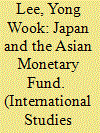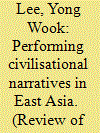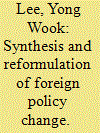|
|
|
Sort Order |
|
|
|
Items / Page
|
|
|
|
|
|
|
| Srl | Item |
| 1 |
ID:
087735


|
|
|
|
|
| Publication |
2009.
|
| Summary/Abstract |
Historical controversies continue to plague northeast Asian politics today, with Chinese and Koreans protesting Japanese history textbooks and Japanese politicians' visits to Yasukuni Shrine, and Koreans protesting Chinese claims that the ancient Kingdom of Goguryo was Chinese, not Korean. Yet, there is little empirical research exploring what, if any, impact historical beliefs have on threat perception and foreign policy preferences in northeast Asia today. On the basis of surveys of Chinese, Japanese, and South Korean university students, this paper explores the relationships among beliefs about the past, perceived threat in the present, and foreign policy preferences for the future. Results and their implications for northeast Asian security are discussed.
|
|
|
|
|
|
|
|
|
|
|
|
|
|
|
|
| 2 |
ID:
074826


|
|
|
|
|
| Publication |
2006.
|
| Summary/Abstract |
Why did Japan propose the creation of the Asian Monetary Fund (AMF) that intentionally excluded the United States from membership in the middle of the Asian financial crisis? I argue that the immediate cause of Japan's AMF proposal lies in Japan's interest in defending the Asian model of economic development against the U.S.-led IMF bailout operation in Thailand. The exclusion of the United States was the key in realizing such an interest. Following an identity approach to international relations, I will demonstrate how Japan's Ministry of Finance (MOF) officials' conception of Japan and the United States as the two rivals promoting different models of economic development (i.e., Japan's state-led vs the U.S. market-based economic development) contributed to the making of Japan's AMF proposal. In doing so, I theoretically develop an identity-intention analytical framework designed to establish causation between an identity and a policy choice that emerge from a social, interactive structure. The framework offers a better way of dealing with the overdetermination of given interests as well as the underspecification of the kinds of interests at stake to which rational theorizing of international relations is often vulnerable.
|
|
|
|
|
|
|
|
|
|
|
|
|
|
|
|
| 3 |
ID:
106018


|
|
|
|
|
| Publication |
2011.
|
| Summary/Abstract |
There has been an ongoing debate about how (or through what mechanisms) global environmental norms have influenced domestic political debates that give rise to green policy choices. In particular, effective international environmental cooperation between transnational and domestic NGOs has been recognized as a key to successful environmental movements. In this regard, the central question guiding research on the politics of environmental norms is, under what condition(s) transnational cooperation among NGOs would be more likely to be sustained so as to achieve its goals. This article proposes that one of the mechanisms missing from the debate is a bottom-up approach through which transnational cooperation can be forged by the initiation of domestic NGOs. Drawing on social movement literature, it is hypothesized that domestic environmental NGOs with more resources, challenging ideologies, and more contentious modes of protest to dominant paradigms is more likely to nurture, develop, and sustain effective transnational cooperation for environmental norms. The validity of this hypothesis is demonstrated through the examination of wetland reclamation projects in Japan and Korea.
|
|
|
|
|
|
|
|
|
|
|
|
|
|
|
|
| 4 |
ID:
058792


|
|
|
|
|
| Publication |
Fall-Winter 2004.
|
|
|
|
|
|
|
|
|
|
|
|
|
|
|
|
| 5 |
ID:
175534


|
|
|
|
|
| Summary/Abstract |
This article aims to uncover the socially constructed normative foundation for the alternative East Asian economic development paradigm to neoliberalism in the context of civilisational politics. The question I seek to address is why East Asian states make value claims when promoting their alternative method of economic development. In addressing this question, I make two interrelated arguments. First, I argue that the politics of Asian values can be understood as another case of non-Western society's struggle to demonstrate multiple paths to modernity. Second, on a deeper level, I show that the discourse and narratives on Asian values is part of civilisation politics aimed to recalibrate the place of East Asia in a world consisting of the civilised and the uncivilised, a divide that still remains today in various forms following European expansion in the nineteenth century. In so doing, I shed light on the performative power of ‘the standard of civilisation’, which naturalises the temporal and sequential hierarchy of civilisational identities in world politics. On the basis of this article's findings, I draw out implications of a recalibrated East Asia for the ideas of hierarchy and progress in world politics.
|
|
|
|
|
|
|
|
|
|
|
|
|
|
|
|
| 6 |
ID:
117201


|
|
|
|
|
| Publication |
2012.
|
| Summary/Abstract |
What explains major foreign policy changes? Why and when does the state change its foreign policy? Despite the importance of foreign policy change, which can (re)shape the nature of a given state's international relations vis-à-vis other states and international systems, explanations of foreign policy change have received only sporadic attention in foreign policy analysis literature. Against this backdrop, I offer in this article a new framework designed to capture both motivational and processual aspects of foreign policy change. I develop the framework by critically examining and synthesising two recent systematic explorations of foreign policy change: one framework within the tradition of rationalism (broadly defined) - David Welch's Painful Choice: A Theory of Foreign Policy Change (2005) - and the other within constructivism - Jeffrey Legro's Rethinking the World: Great Power Strategies and International Order (2006). For the motivational analysis, I link the role of crisis-defining ideas to threat perception to sharpen prospect theory. I illustrate this reformulated synthesis with an example of Japan's policy shift toward East Asian financial regionalism.
|
|
|
|
|
|
|
|
|
|
|
|
|
|
|
|
| 7 |
ID:
088918


|
|
|
|
|
| Publication |
2009.
|
| Summary/Abstract |
In May 2002, China decide not to repatriate
north
korean asylum seekers who fled to Shenyang.The decision was not only in contravention of the 1986 North Korea-China bilateral repatriation agreement, but also constituted China's repudiation of its policy denying refugee status to North Koreans in China.
|
|
|
|
|
|
|
|
|
|
|
|
|
|
|
|
|
|
|
|
|